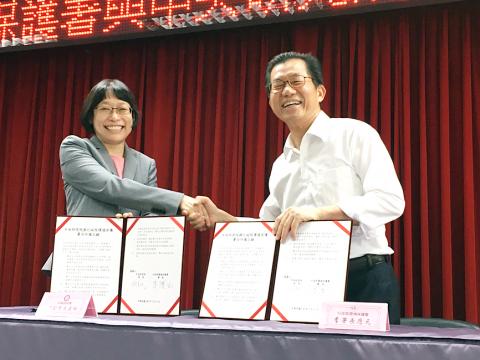The Environmental Protection Administration (EPA) and Academia Sinica yesterday signed a memorandum of understanding (MOU) on technological interaction in a bid to establish more precise ways to identify and regulate pollution.
“Environmental problems should be solved scientifically,” Academia Sinica vice president Chou Mei-yin (周美吟) said, adding that she hopes the two agencies could increase collaboration in areas such as environmental testing, big data analysis and equipment purchasing.
Technology developed by the nation’s top academic institution are to be installed in portable devices, which would enable local officials to identify pollution sources immediately and accurately, EPA Minister Lee Ying-yuan (李應元) said.

Photo: Yang Mian-chieh, Taipei Times
The institution has developed a surface-enhanced Raman scattering (SERS) device for identifying water pollutants like cyanide and hexavalent chromium, which are often found in wastewater from electroplating factories.
Even slight exposure to cyanide can be deadly, while hexavalent chromium is a carcinogen that could damage the liver and nervous system, the EPA said.
The SERS device can produce test results in about three hours using only a 0.007ml sample, much more efficient than the traditional method that requires 1,000ml and at least one day’s time, Academia Sinica Institute of Atomic and Molecular Sciences researcher Wang Juen-kai (王俊凱) said.
While the device had been used for medical and pathological studies, this is the first time it would be used for environmental testing, he said.
The institute is working to make the device smaller and portable, and expects to launch it by the end of the year, he said.
“The pollution database is not complete enough,” Academia Sinica Research Center for Environmental Changes deputy director Chou Chung-kuang (周崇光) said when asked about the biggest problem when conducting domestic environmental studies.
For example, China is often blamed for air pollution, but pollution sources often change, Chou said, adding that more precise diagnoses are needed.
The EPA will build another air monitoring station alongside the institute’s station at New Taipei City’s Cape Fuguijiao (富貴角), the nation’s northernmost point, to better evaluate air pollution from China during the winter, Chou added.

The Central Weather Administration (CWA) today issued a sea warning for Typhoon Fung-wong effective from 5:30pm, while local governments canceled school and work for tomorrow. A land warning is expected to be issued tomorrow morning before it is expected to make landfall on Wednesday, the agency said. Taoyuan, and well as Yilan, Hualien and Penghu counties canceled work and school for tomorrow, as well as mountainous district of Taipei and New Taipei City. For updated information on closures, please visit the Directorate-General of Personnel Administration Web site. As of 5pm today, Fung-wong was about 490km south-southwest of Oluanpi (鵝鑾鼻), Taiwan's southernmost point.

Tropical Storm Fung-Wong would likely strengthen into a typhoon later today as it continues moving westward across the Pacific before heading in Taiwan’s direction next week, the Central Weather Administration (CWA) said. As of 8am, Fung-Wong was about 2,190km east-southeast of Cape Oluanpi (鵝鑾鼻), Taiwan’s southernmost point, moving westward at 25kph and possibly accelerating to 31kph, CWA data showed. The tropical storm is currently over waters east of the Philippines and still far from Taiwan, CWA forecaster Tseng Chao-cheng (曾昭誠) said, adding that it could likely strengthen into a typhoon later in the day. It is forecast to reach the South China Sea

Almost a quarter of volunteer soldiers who signed up from 2021 to last year have sought early discharge, the Legislative Yuan’s Budget Center said in a report. The report said that 12,884 of 52,674 people who volunteered in the period had sought an early exit from the military, returning NT$895.96 million (US$28.86 million) to the government. In 2021, there was a 105.34 percent rise in the volunteer recruitment rate, but the number has steadily declined since then, missing recruitment targets, the Chinese-language United Daily News said, citing the report. In 2021, only 521 volunteers dropped out of the military, the report said, citing

Nearly 5 million people have signed up to receive the government’s NT$10,000 (US$322) universal cash handout since registration opened on Wednesday last week, with deposits expected to begin tomorrow, the Ministry of Finance said yesterday. After a staggered sign-up last week — based on the final digit of the applicant’s national ID or Alien Resident Certificate number — online registration is open to all eligible Taiwanese nationals, foreign permanent residents and spouses of Taiwanese nationals. Banks are expected to start issuing deposits from 6pm today, the ministry said. Those who completed registration by yesterday are expected to receive their NT$10,000 tomorrow, National Treasury